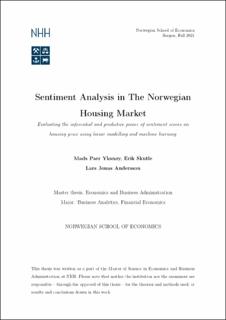| dc.description.abstract | In this thesis, we investigate how information and sentiment provided through news media
affect prices in the Norwegian housing market. Our analysis is based on news articles from
selected Norwegian news outlets, transaction data from the housing market in Oslo and
macroeconomic data. We derive sentiment values from the news articles using a recurrent
neural network algorithm. We infer on the data using an OLS regression model and study
the predictive ability of sentiment using XgBoost on models with and without sentiment
data.
We observe that the variation in measured sentiment values explains almost half the
variation in the housing price index for Oslo. This suggests that people respond to the
information provided in the newspapers, and that the price development is not a random
walk. Further, we observe that the sentiment coefficient is significant both in statistical
and economic terms after we control for fundamentals, suggesting that people react to
sentiment more excessively than what is justified by the fundamentals. The implication
is that the housing market is not fully efficient. This is supported by data showing that
an increase in sentiment values also widens the difference between asking price and final
price. With the introduction of the XgBoost model, we decrease predictive error present
in linear regression predictive benchmark by 14.96 percent. Our best sentiment model
causes a decrease in prediction error of 2.52 percent relative to the reference model. This
leads us to conclude that both fundamental information and sentiment is associated with
price developments in the Norwegian housing market. | en_US |
